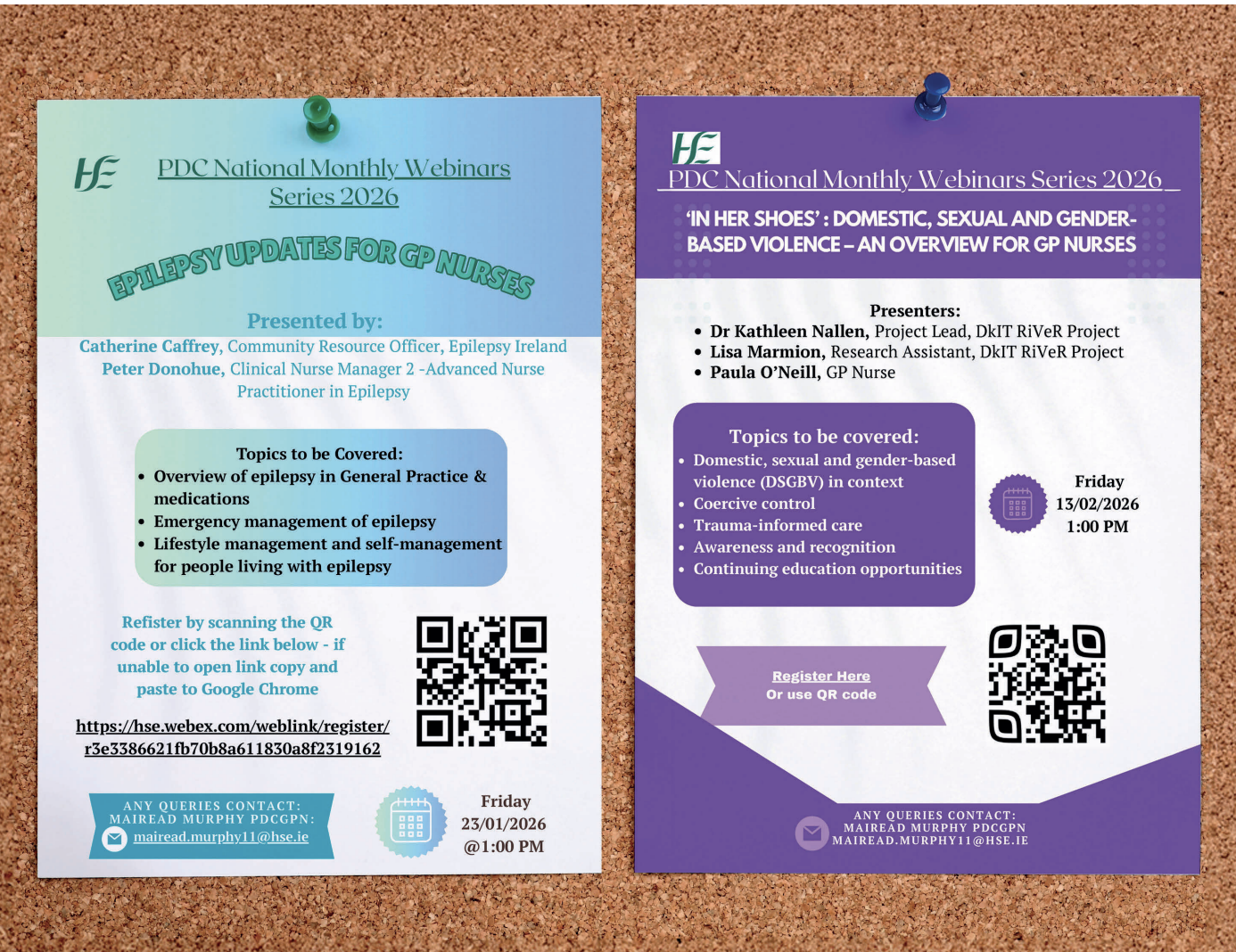“Continuing professional development (CPD) encompasses experiences, activities, and processes that contribute towards the development of a nurse or midwife as a healthcare professional. CPD is, therefore, a lifelong process of both structured and informal learning.” (Nursing and Midwifery Board of Ireland, 2015).
Each registered nurse is responsible for ongoing learning experiences to maintain standards and provide quality patient care. Online learning is crucial in a world where clinical workload and demands on time are ever increasing and the field of healthcare ever evolving. While face-to-face learning has advantages in terms of connection with others, practical support, and more, the availability of online learning via webinars, video learning, or online e-learning modules empowers us to maintain high standards of care, adapt to changes in the healthcare landscape, and foster lifelong learning conveniently.
Online resources provide us with access to the latest research and guidelines in areas that are relevant to our practice. Digital learning allows us to study at our own pace and time, making it easier to balance work, home life, and education. These platforms offer various formats, such as webinars, videos, and interactive modules, and this diversity caters to different learning styles – enhancing comprehension and retention. Online resources can also be more affordable than traditional courses, with many platforms offering free or low-cost options, making continuing education more accessible.

HSELanD
HSELanD is the HSE’s online learning platform that offers a range of courses catering to a diverse range of healthcare workers. It is accessible to all nursing staff in all areas of employment and contains a useful portfolio section, allowing users to keep a record of current and past learning, store certificates of completion, and receive reminders of renewals and updates.
To access HSELanD as a general practice nurse (GPN), there are some simple steps to follow (Figure 1). It is important to update your profile on HSELanD, to identify your area of work as general practice, and to complete the details in relation to qualifications etc. This allows us as professional development teams to assess the demand for, and engagement with, HSELanD programmes from general practice, which will in turn inform the development of updated and new programmes on that platform. If you are prompted to update your profile or have moved from another sector to general practice, please keep this in mind.
The best advice we can give is to log onto HSELanD, move around within it, check out the various catalogues, search engine, and hubs; and source the courses and resources that are of interest to you. As always, if you would like advice or assistance with any aspect of practice development, do not hesitate to contact one of the PDCs for GPNs.
HSELanD modules of interest
The National Cancer Control Programme (NCCP) Community Cancer Nursing eLearning modules: This programme was created by the HSE’s NCCP in conjunction with patient representatives and clinical colleagues. It has been formally in existence since 2011 and was originally delivered face-to-face.
Due to advancements in cancer treatments, the current requirement for services have changed, as more cancer treatments and services are being delivered safely in the community. This progressive suite of modules will replace the existing training in this area, refreshing the learning content and bringing the programme into an innovative, updated online format. This programme will ensure that community-based nurses are equipped with the knowledge, skills, and attitudes to safely provide care to individuals with cancer at all stages of the cancer journey.
The programme consists of three modules. Module one: Introducing cancer and its effects on the person. Module 2: Assessing and managing a person with cancer. Module 3: Managing a person with a central venous access device. Completion requires a multiple-choice exam with a pass mark of 80
per cent. The programme will ensure that community-based nurses are equipped with the knowledge, skills, and attitudes to safely provide care to individuals with cancer at all stages of the cancer journey.
The target audience for this programme is registered nurses working in community settings including public health nurses, community nurses, GPNs, and nurses working in community intervention teams. However, any nurse or health and social care professional who is interested in learning more about cancer and the effect it has on the person should complete the programme. Estimated time to complete each module is 45 minutes, and each module earns three CPD hours from the NMBI.
Palliative Care Needs Assessment (PCNA): This e-learning programme has been developed for all health and social care professionals who might meet patients with palliative care needs. Many patients often require both general and specialist palliative care. This course aims to ensure that people with palliative care needs will have the needs of greatest concern to them identified and responded to by skilled and confident staff.
The PCNA is a means of identifying palliative care needs that are of the highest concern to a person with a life-limiting condition. An appropriate care plan can then be developed to respond to these needs. A palliative care approach is highly appropriate for those patients who have been diagnosed with a chronic life-limiting condition such as chronic obstructive pulmonary disease (COPD) or heart failure, not just those with a cancer diagnosis. A PCNA should be considered at the time of diagnosis, disease progression, changes in circumstance, or by request, as well as at end-of-life.
This programme should take about 60 minutes to complete, plus assessments, and is granted one CPD hour by NMBI.
Primary Childhood Immunisation Programme (PCIP): This new module supports your professional responsibility of advising parents and guardians about the importance of the vaccines within the PCIP, and to deliver a safe and effective immunisation programme, administering the recommended vaccines to children in line with the National Immunisation Advisory Committee guidance. It is suitable for healthcare workers involved in the promotion and delivery of immunisations, specifically GPs, GPNs, and HSE vaccination staff.
This module has just been reviewed and updated to include the 2024 changes to the PCIP.
National standards for infection prevention and control in community services – putting the standards into practice: This programme has been designed and developed by the Health Information and Quality Authority to support staff in community health and social care services to implement safe practice in infection prevention and control, as well as antimicrobial stewardship. It contains practical examples, real-life scenarios, and day-to-day practice tips for staff across a range of health and social care settings in the community, such as residential services for older people and people with a disability, daycare services, GP practices, dental services, and care delivered in the home.
The module aims to promote good practice in the area, while also addressing knowledge and skills gaps identified through extensive stakeholder engagement. It contains self-reflection questions to help staff to think about how they are already applying the standards, identify areas they may be able to improve, and how they might set about doing that.
Other recommended modules:
- Children first;
- Medicines management;
- Infection prevention and control;
- AMRIC hand hygiene;
- AMRIC aseptic technique;
- Making every contact count;
- Chronic disease management in general practice;
- An introduction to chronic respiratory disease;
- Asthma e-learning programme;
- COPD inhalers and inhaler technique;
- The nursing management of adults with type 2 diabetes mellitus;
- Introduction to heart failure;
- Performing venepuncture on an adult;
- How to record an electrocardiogram.












